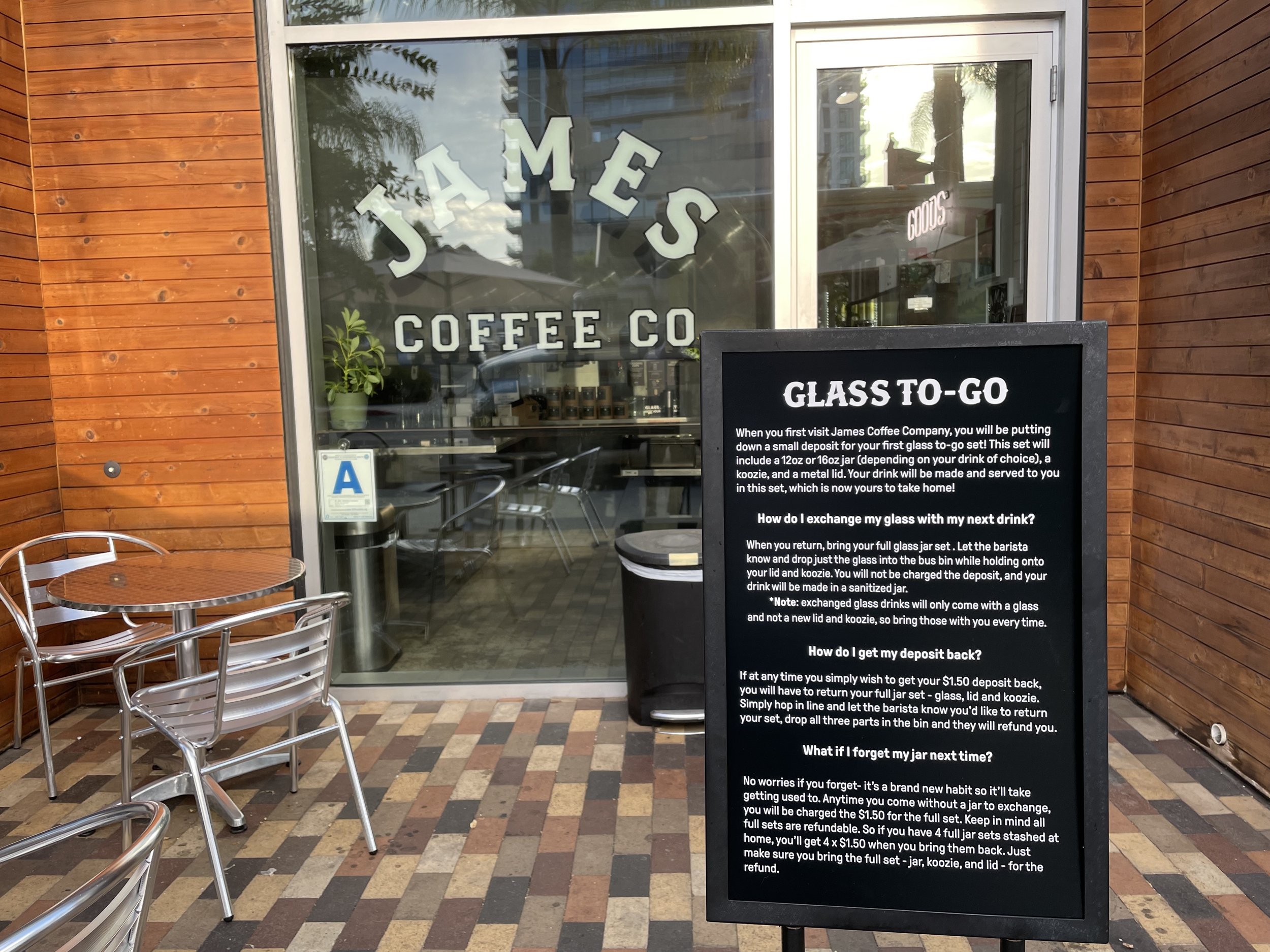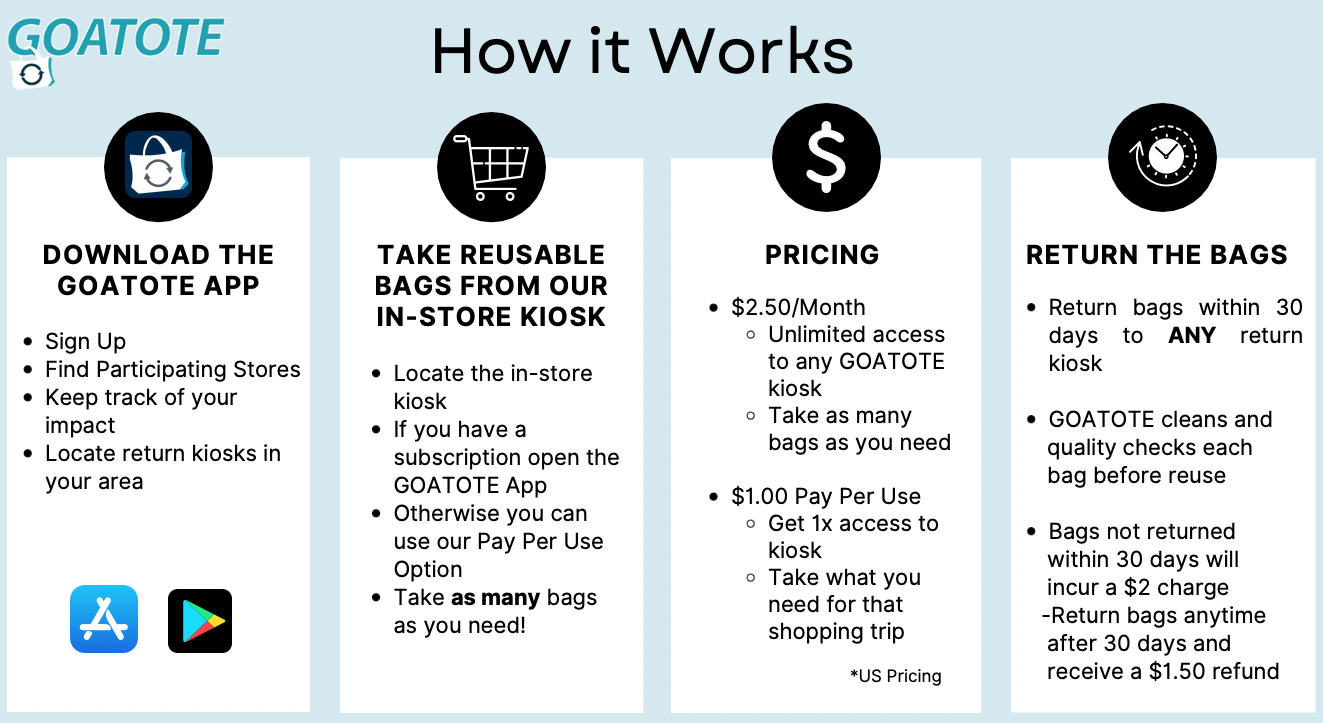Sustainability is all the rage.
Consumers increasingly want it. Companies everywhere promote it. Governments demand it with new laws mandating sustainable practices.
The big trick is adopting sustainable practices without negatively impacting the customer experience. People want to save the planet, but they don't want to be inconvenienced.
Single-use grocery bags and coffee cups are an example. Billions get thrown away each year, but customers continue to use them because they are quick and convenient.
I recently followed the customer journey for two companies that are trying to tackle this issue.
One is James Coffee Co., a chain of four coffee shops in San Diego that provides customers with reusable glass jars instead of disposable cups. The other is Goatote, a reusable shopping bag system that's being piloted in New Jersey.
Let's take a closer look at each program to see if they can save the planet without ruining the customer experience. We’ll test each one via the Guaranteed Customer Experience framework.
The big question: does it work?
What promise do they make?
Companies attract new customers by promising to solve problems that people care about. According to the Guaranteed Customer Experience framework, a good marketing promise meets three criteria:
Valuable: it addresses a problem that customers want to solve
Specific: it's clear enough to avoid confusion
Realistic: the promise can be consistently kept
James Coffee Co. promises to help customers eliminate single-use coffee cups by serving drinks in reusable glass jars.
A $1.50 deposit will get you a "Glass To-Go" set consisting of a glass jar, metal lid, and a koozie. You can return the set for a refund anytime or exchange it for a new one on your next visit.
That promise is consistently explained across the company's website, in-store signage, and via individual employees. Let’s see how it compares to the framework:
Valuable: Mixed. The promise is valuable if you are concerned about reducing single-use cups.
Specific: Yes, the Glass To-Go program is specific and clear.
Realistic: Yes, the program works seamlessly.
I think James Coffee is underselling the value by missing a problem customers really want to solve: great tasting coffee.
Coffee sipped from a glass tastes much better than when you drink it through a plastic lid or from a paper cup. While sustainability is a good aim, my guess is more customers would be moved by the tangible benefit of better coffee.
Goatote promises to help customers who forgot their reusable shopping bags or don’t already have one. The state of New Jersey recently banned single-use shopping bags at large grocery stores, which creates a need for reusable shopping bags.
You can rent an unlimited number of reusable bags for $2.50 per month, or pay $1.00 for a one-time rental.
I didn’t observe a single customer use the Goatote system on two visits to the Target in Jersey City, New Jersey. Let’s look at how it compares to the Guaranteed Customer Experience Framework to understand why the promise was not compelling:
Valuable: No, the promise is not valuable.
Specific: No, the promise is inconsistent and unclear.
Realistic: No, the program does not work.
Value can be defined by how well a promise addresses a customer's problem. At the Target store I visited in Jersey City, customers had the option to rent a Goatote bag for $1.00 (or a $2.50 monthly subscription) or buy a reusable Target bag for $.99.
The Target option clearly provided more value to a customer who forgot to bring a bag:
It’s one cent cheaper.
You didn’t need to return the bag. (Goatote rentals are 30 days.)
Unlike Goatote, you don’t need a separate transaction to acquire a bag.
Specific promises are clear and easy to understand. The Goatote program was not consistently or clearly explained. For example, the Goatote website is unclear about whether you need to download an app or how bags are returned.
I emailed Goatote to get clarification, but did not receive a response. A Target customer service rep told me via chat that I did need to download the Goatote app. Inside Target, a sales associate also told me I needed to download the app.
It turns out, you don’t need to download the app.
Realistic promises are ones you can consistently keep. Goatote customers must first create an account and I was unable to complete this step. This made the program unrealistic.
Is the promise kept?
A good promise can win a customer's business, but keeping your promise is what earns a customer's trust and gets them to come back.
James Coffee Co. easily kept its Glass To-Go promise. The process was smartly designed to include the reusable glass in the normal flow of ordering coffee.
A Glass To-Go kit was automatically added to each new order.
The cost of the kit was taken off your order if you brought in one to exchange.
Customers could get their deposit refunded by bringing the kit back to the counter.
A simple, frictionless customer experience makes a sustainability program easy for customers to get behind. I saw more than 60 percent of James Coffee Co. customers walk-in with a Glass To-Go kit already in hand and nobody seemed to have any problems with it.
And the coffee was very good.
Goatote was unable to keep its promise to rent me a reusable shopping bag. The process was very convoluted and then I hit a dead end.
To start, you either had to download the Goatote app or scan a QR code at the Goatote kiosk. This is a separate transaction from whatever you are purchasing at Target, so you’ll need to acquire your bag before or after you make your Target purchases.
I scanned the QR code rather than downloading the app.
Next, you had to set-up an account. My first attempt at a password was too weak, so I had to come up with a new password before moving forward. This extra friction would have been enough to stop me from renting a $1.00 shopping bag if I wasn’t writing this blog post.
The "Payment Method" button on the signup screen suggested I'd be entering my payment info next, but first I had to agree to the Terms of Service and the Privacy Policy.
This is where I hit a dead end.
Clicking on the "Terms of Service" link led me to the website for a seemingly unrelated company. There were no terms of service to be found, so I couldn't read exactly what kind of shenanigans I'd be getting into with this $1.00 shopping bag rental.
Images of past Blockbuster Video late fees danced in my head, so no rental for me.
The privacy policy link did work. It was onerous, to say the least, clocking in at 3,796 words. Who knew a reusable shopping bag rental required such an extensive contract?!
Meanwhile, customers could simply purchase a $.99 reusable Target bag as part of their regular transaction. It was a simple process with no accounts to create, apps to download, or terms of service to read.
Does customer service support the promise?
Customer service is defined as the advice or assistance a company provides to those people who buy or use its products or services.
The customer service at James Coffee Co. was great.
A friendly barista clearly explained the Glass To-Go program to me. His explanation was consistent with what I read on the James Coffee Co. website and the sign I saw in front of the store.
He went a step farther by offering me a sample of coffee he had just brewed. Of course, he served it in a reusable glass rather than a disposable cup.
Goatote's customer service was uneven and confusing.
The company never responded to questions I emailed to both of the email addresses listed on its website. I did track down an email address for Renee Lundahl, Goatote's co-founder, who replied quickly, but I doubt the average customer would go to that trouble.
Target's customer service also sent an inconsistent message.
I did an online chat with a Target customer service rep prior to trying the Goatote system in-store. He told me that I had to download the Goatote app to use the system (which isn't true), though he did admit he had very little information on the program.
An associate in the store also told me the app was required to rent a bag, though I was able to initiate the process from the kiosk without an app. She didn't know much else about the system, though she did tell me people rarely used it.
Conclusion
The big question for each program is does it work?
James Coffee Co: Yes
Goatote: No
James Coffee Co. had a steady stream of customers on the morning I visited. More than 60 percent brought their Glass To-Go kit with them, which indicates they were repeat customers.
I did not see a single customer use the Goatote system. A Target employee confirmed the system was rarely used and customers generally chose to purchase the $.99 reusable Target bags if they didn’t already have a bag of their own.
The big lesson here is sustainability is important, but the customer experience has to be right if you want customers to accept your program. That means promising to solve a problem customers care about and then taking steps to keep your promise.
Check out The Guaranteed Customer Experience if you’d like to apply this model to one of your own products or services.









